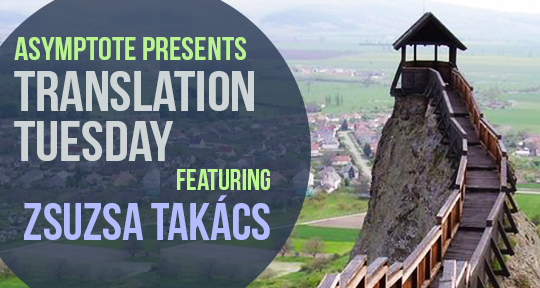Jelenkor is one of the most prestigious literary journals in Hungary. As often happens with small languages, literary prestige does not quite translate to a very wide reach: apart from the print version, Jelenkor‘s poems and short stories are read by a few hundred people at best. As the end of 2017 was approaching, journalist Péter Urfi set out to find the closest Hungarian equivalent to the success of “Cat Person,” Kristen Roupenian’s short story that took the internet by surprise. To Urfi’s astonishment, the winner was not only a poem instead of prose, it was not written by a writer with a significant online presence. It was Zsuzsa Takács’s “Provided we have a soul,” published in Jelenkor. More than 70,000 people read the poem and over 1,200 liked it without any significant publicity effort. The humanism, measured dignity, and accuracy of the poem might account for some of this popularity. It also speaks of the frustration many feel at the gradual, relentless dismantling of democratic institutions in the country, at once experiencing it and able to adopt the slight condescension of the token catastrophe tourist. Ultimately it is not incredibly important to pin down the reasons, as resonance is an elusive matter. The sheer power of the poem shall speak for itself.
Provided we have a soul
He’s not known to have one shape. That’s the rub.
Can we trust the one who keeps constantly changing
his appearance—Blind Hope? Now a beggar
on the corner, now a young woman, the servant who
follows her masters to Auschwitz, the Danube
Delta, Vorkuta, serving them even there: digging
up with her bare nails the roots from under
the snow, or scavenging in the dumpsters
for them. A decrepit old man telling stories to keep
our body and soul together, provided we have
a soul, and are not copulating animals only.
When night lasts not for the usual eight
hours but for weeks or years or decades
and if the sun rises it dawns on us only
by mistake, can we still trust him? When the air-conditioned
buses bring in the catastrophe tourists in our battered
city, and our tyrant’s eunuch shows them around
in the luxury hotel and turns on the gold taps,
yet they bang their fists on the table: they didn’t
pay up for boozing whisky in the Potemkin village,
and insist that they would like to meet us too.
Do we have rights? soap? do we have books?
paid extra hours? schools? hospitals? Our
orphanages they are especially curious about, for they have
already seen similar ones some other place, and remember
how they sucked. They want to know if we feel like travelling
as they do. They tell us about a tidal wave in Asia, show us
pictures: here they are, can we see, with their Sony
cameras standing above the corpses half buried
in the mud. They bid us take a seat and order salmon:
would we like to join them? We stand under the surveillance
cameras with a starved look, but will not eat.
If their watching makes us uneasy, no problem,
they’ll turn away. But we are watched every second! –
we answer, and keep staring: they are so beautiful.
Do we still hope?—they ask, and we remember
the beggar on the corner of Petőfi Street, the young
woman who followed us to Auschwitz, the Danube
Delta, Vorkuta. The cameras are busily
flashing, and in order not to mix us up with
others, they meticulously put down the date and place.
Translated from the Hungarian by Erika Mihálycsa
Zsuzsa Takács is the doyenne of Hungarian poetry. She started publishing in the early 1970s, gradually developing a consciously understated, slightly elegiac lyric voice coupled with profoundly personal themes, addressing both private and historical traumas. A former professor of Romance literatures, she has translated St. John of the Cross, Pessoa, Borges and others into Hungarian. Her work is widely anthologized, and has been translated into English by George Szirtes, Laura Schiff, Peter Sherwood, Ottilie Mulzet, and Erika Mihálycsa. Her poems and stories have appeared recently in World Literature Today, The Missing Slate, Two Lines, The Collagist, Envoi, A Public Space, and Locomotive Magazine. Reviews of her work and an interview can be read on Hungarian Literature Online. The poem[s] selected here are from her volume A Vak Remény [Blind Hope] forthcoming in 2018. She lives in Budapest.
Erika Mihálycsa is a lecturer in twentieth- and twenty-first-century British and Irish fiction at Babes-Bolyai University Cluj, Romania. She is a Joyce and Beckett scholar. She has translated fiction and poetry by Beckett, Flann O’Brien, Orwell, Julian Barnes, Jeanette Winterson, Anne Carson, william carlos williams, Patrick McCabe, and others into Hungarian. Her translations of contemporary Hungarian prose and poetry have come out to date, or are forthcoming in World Literature Today, Numèro Cinq, Two Lines, Envoi, The Collagist, The Missing Slate, B O D Y, Locomotive Magazine. Together with Rainer J. Hanshe, she edits the literary and arts journal HYPERION: For the Future of Aesthetics, issued by Contra Mundum Press. She has published short prose in both Hungarian and English.
*****
Read more translations from the Asymptote blog:

